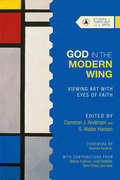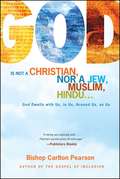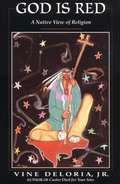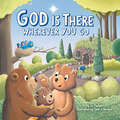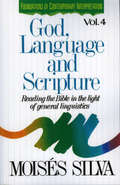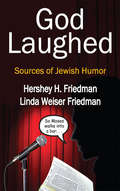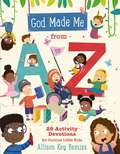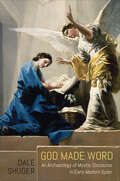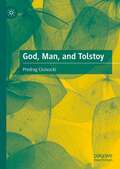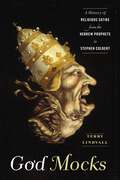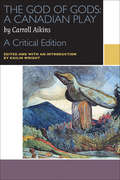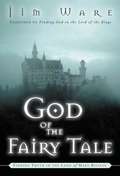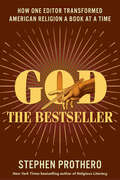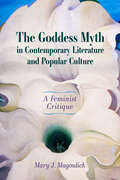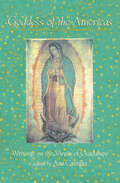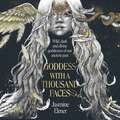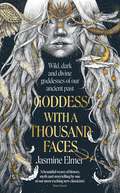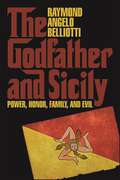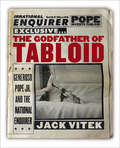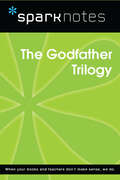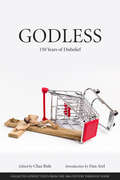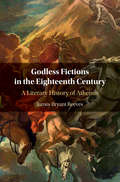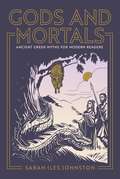- Table View
- List View
God in the Modern Wing: Viewing Art with Eyes of Faith (Studies in Theology and the Arts Series)
by G. Walter Hansen Cameron J. Anderson Cameron J. Anderson, G. Walter HansenShould Christians even bother with the modern wing at the art museum? After all, modern art and artists are often caricatured as rabidly opposed to God, the church—indeed, to faith of any kind. But is that all there is to the story? In this Studies in Theology and the Arts volume, coeditors Cameron J. Anderson and G. Walter Hansen gather the reflections of artists, art historians, and theologians who collectively offer a more complicated narrative of the history of modern art and its place in the Christian life. Here, readers will find insights on the work and faith of artists including Marc Chagall, Jackson Pollock, Mark Rothko, Andy Warhol, and more. For those willing to look with eyes of faith, they may just find that God is present in the modern wing too.
God Is Not a Christian, Nor a Jew, Muslim, Hindu...
by Carlton PearsonThe author of The Gospel of Inclusion continues to rouse organized religion as he raises controversial issues and provides enlightening answers to the deepest questions about God and faith. What is God? Where is God? Who is the one true God? Questions such as these have driven a thousand human struggles, through war, terrorism, and oppression. Humanity has responded by branching off into multiple religions, including Christianity, Judaism, Islam--each one pitted against the other. But it doesn't have to be that way.In God Is Not a Christian, nor a Jew, Muslim, Hindu . . . , the provocative and acclaimed Bishop Carlton Pearson follows up on his celebrated first book, The Gospel of Inclusion, to tackle these questions and many more, exploring new ideas about God and faith and putting forth the stunning assertion that God belongs to no particular religion but is an ever-loving presence available to all. For these beliefs, Bishop Pearson lost his thriving Pentecostal ministry but was catapulted instead into a greater pulpit. His readership has grown through appearances on national television and an extensive speaking schedule. With the world in the midst of a holy war, there is no better time for the wisdom of Bishop Pearson to reach a global audience.Bishop Pearson's many loyal fans, along with new readers, will surely welcome this provocative and eye-opening exploration of a deeper faith, one that goes far beyond any fundamentalist way of thinking, be it Christian, Jewish, Muslim, Hindu, etc. Simply put, Bishop Pearson dares to tell the truth so many others are too afraid to face.
God Is Red: A Native View of Religion (updated edition)
by Vine Deloria Jr.Deloria, a Native American educator, lawyer, and philosopher, has updated his classic work on native religion. In God is Red Deloria argues that Christianity has failed today's society, and describes basic tenets that underlie Native religions.
God Is There Wherever You Go
by Jo ParkerPerfect for bedtime, nap time, or anytime in between, God Is There Wherever You Go provides a valuable opportunity to teach children that through faith they are always guided and protected by the Lord.Whimsical illustrations and inspirational verses from the Bible remind young readers that God is there wherever they go. And with a beautiful bookplate for personalization, this the perfect book for someone special.
God, Language and Scripture
by Moises SilvaThe primary aim of God, Language and Scripture is to provide guidance in the use of biblical languages. Secondarily this volume initiates the reader to the wonders and workings of language and points out how language is often misused, especially in regard to the Bible. This volume, however, in no way anticipates all the ways of mishandling language. Silva's emphasis is on 'global' rather than detailed concerns (though selected specific examples are used) of how language is misused. The book includes an account of the birth and growth of modern linguistics, an appreciation of its interdisciplinary character, particularly its ties with literary criticism, sociology, anthropology, psychology, and science. It surveys all levels of language description, but emphasizes the semantic and stylistic aspects of grammar and syntax, vocabulary, and discourse. In addition, it considers the transmission of the Bible (textual criticism and translation) as a mode of linguistic communication and interpretive process.
God Laughed: Sources of Jewish Humor (Jewish Studies)
by Hershey H. FriedmanHumor has had a profound effect on the way the Jewish people see the world, and has sustained them through millennia of hardships and suffering. God Laughed reviews, organizes, and categorizes the humor of the ancient Jewish texts-the Hebrew Bible, the Talmud, and Midrash-in a clear, readable, and accessible manner. These works have influenced the Jewish people in many ways, and all are replete with humor and wit. Inevitably, this oeuvre of Jewish humor has itself influenced generations of comics, as well as genres of humor. The authors use examples of Biblical humor from several broad categories, including irony, sarcasm, wordplay, humorous names, humorous imagery, and humorous situations. Because their primary purpose is not to entertain, but to teach humanity how to live the ideal life, much of the humor in the Talmud and the Midrash has a single purpose: to demonstrate that evil is wrong and even, at times, ludicrous. This may help explain why approximately 1,500 years after its closing, the Talmud is still such a fascinating work.
God Made Me from A to Z: 26 Activity Devotions for Curious Little Kids
by Allison Key BemissTeach preschoolers their ABCs and faith using the hands-on, sensory experiences and projects in this creative activity devotional that explores living for Jesus with curiosity and excitement.Written by a mom, teacher, and expert in STEAM activities and early childhood education, this activity devotional is packed with opportunities for little ones to grow, learn, and have fun in God's great, exciting world. This book includes ...26 devotions for each letter that focus on curiosity and inquiry and include biblically-rooted "I Am" affirmations;short, easy-to-understand Bible verses and prayers that speak to a young child's sweet and joyful heart;active projects, crafts, recipes, games, and songs for hands-on sensory learning;an introduction for families overviewing the research-based design and strategies embedded in the projects; andaccess to a downloadable alphabet coloring book.God Made Me from A to Z is designed fortoddlers and preschoolers ages 2 to 5high-energy children, neurodivergent children, and children with special needsSunday school classes, preschool lessons, and homeschool familiesa New Year's or summer family project, starting a new school year, and gifts for birthdays, Easter baskets, and ChristmasYoung children are natural explorers. Help them discover God's world and how wonderfully God created them while encouraging their hearts with scriptural truths and gifting them special family memories.
God Made Word: An Archaeology of Mystic Discourse in Early Modern Spain (Toronto Iberic)
by Dale ShugerThe Golden Age of Spanish mysticism has traditionally been read in terms of individual authors or theological traditions. God Made Word, however, considers early modern Spanish mysticism as a question of language and as a discourse that circulated in concrete social, institutional, and geographic spaces. Proposing a new reading of early modern Spanish mysticism, God Made Word traces the struggles over the representation of interiorized spiritual union – the tension between making it known and conveying its unknowability – far beyond the usual canon of mystic literature. Dale Shuger combines a study of genres that have traditionally been the object of literary study, including poetry, theatre, and autobiography, with a language-based analysis of other areas that have largely been studied by historians and theologians. Arguing that these generic separations grew out of an increasing preoccupation with the cultivation and control of interiorized spirituality, God Made Word shows that by tracing certain mystic representations we come to understand the emergence of different discursive rules and expectations for a wide range of representations of the ineffable.
God, Man, and Tolstoy
by Predrag CicovackiThis book examines Leo Tolstoy’s struggle to understand the relationship of God and man, in connection with his attempt to answer questions regarding the meaning of life. Tolstoy addressed such issues in a systematic way and with great concerns for the future of humanity. Predrag Cicovacki approaches Tolstoy both as a thinker and as an artist, and examines various sides of his intellectual and artistic engagement: his social criticism, his ambiguous relationship to nature, his understanding of art, and his attempted reconstruction of the true religion. By combining philosophical, religious, and literary analysis, Cicovacki undertakes an interdisciplinary study, showing much can be learned from Tolstoy's insights, as well as from his mistakes.
God Mocks: A History of Religious Satire from the Hebrew Prophets to Stephen Colbert
by Terry LindvallWinner of the 2016 Religious Communication Association Book of the Year AwardIn God Mocks, Terry Lindvall ventures into the muddy and dangerous realm of religious satire, chronicling its evolution from the biblical wit and humor of the Hebrew prophets through the Roman Era and the Middle Ages all the way up to the present. He takes the reader on a journey through the work of Chaucer and his Canterbury Tales, Cervantes, Jonathan Swift, and Mark Twain, and ending with the mediated entertainment of modern wags like Stephen Colbert. Lindvall finds that there is a method to the madness of these mockers: true satire, he argues, is at its heart moral outrage expressed in laughter. But there are remarkable differences in how these religious satirists express their outrage.The changing costumes of religious satirists fit their times. The earthy coarse language of Martin Luther and Sir Thomas More during the carnival spirit of the late medieval period was refined with the enlightened wit of Alexander Pope. The sacrilege of Monty Python does not translate well to the ironic voices of Soren Kierkegaard. The religious satirist does not even need to be part of the community of faith. All he needs is an eye and ear for the folly and chicanery of religious poseurs. To follow the paths of the satirist, writes Lindvall, is to encounter the odd and peculiar treasures who are God’s mouthpieces. In God Mocks, he offers an engaging look at their religious use of humor toward moral ends.
The God of Gods: A Critical Edition (Canadian Literature Collection)
by Carroll AikinsCarroll Aikins’s play The God of Gods (1919) has been out of print since its first and only edition in 1927. This critical edition not only revives the work for readers and scholars alike, it also provides historical context for Aikins’s often overlooked contributions to theatre in the 1920s and presents research on the different staging techniques in the play’s productions. Much of the play’s historical significance lies in Aikins’s vital role in Canadian theatre, as director of the Home Theatre in British Columbia (1920–22) and artistic director of Toronto’s Hart House Theatre (1927–29). Wright reveals The God of Gods as a modernist Canadian work with overt influences from European and American modernisms. Aikins’s work has been compared to European modernists Gordon Craig, Adolphe Appia, and Jacques Copeau. Importantly, he was also intimately connected with modernist Canadian artists and the Group of Seven (who painted the scenery for Hart House Theatre). The God of Gods contributes to current studies of theatrical modernism by exposing the primitivist aesthetics and theosophical beliefs promoted by some of Canada’s art circles at the turn of the twentieth century. Whereas Aikins is clearly progressive in his political critique of materialism and organized religion, he presents a conservative dramatization of the noble savage as hero. The critical introduction examines how The God of Gods engages with Nietzschean and theosophical philosophies in order to dramatize an Aboriginal lover-artist figure that critiques religious idols, materialism, and violence. Ultimately, The God of Gods offers a look into how English and Canadian theatre audiences responded to primitivism, theatrical modernism, and theosophical tenets during the 1920s.
God of Many Names: Play, Poetry and Power in Hellenic Thought, From Homer to Aristotle
by Mihai I. SpariosuTracing the interrelationship among play, poetic imitation, and power to the Hellenic world, Mihai I. Spariosu provides a revisionist model of cultural change in Greek antiquity. Challenging the traditional and static distinction made between archaic and later Greek culture, Spariosu's perspective is grounded in a dialectical understanding of values whose dominance depends on cultural emphasis and which shifts through time.Building upon the scholarship of an earlier volume, Dionysus Reborn, Spariosu her continues to draw on Dionysus--the "God of many names," of both poetic play and sacred power--as a mythical embodiment of the two sides of the classical Greek mentality. Combining philosophical reflection with close textual analysis, the author examines the divided nature of the Hellenic mentality in such primary canonic texts as the Iliad, the Odyssey, the Theogony, Works and Days, the most well-known of the Presocratic fragments, Euripides' Bacchae, Aristophanes' The Frogs, Plato's Republic and Laws, and Aristotle's Poetics and Politics.Spariosu's model illuminates the many of the most enduring questions in contemporary humanistic study and addresses modern questions about the nature of the interrelation of poetry, ethics, and politics.
God of the Fairy Tale: Finding Truth in the Land of Make-Believe
by Jim WareWhat Treasures Are Hidden in the Enchanted Woods? More than just bedtime traditions, more than simple children's literature, the most enduring stories are echoes of the greatest of all stories, the Gospel. God of the Fairy Tale is a collection of spiritual reflections on the truths found in classic fairy tales, truths that point us to the ultimate Truth about God, redemption, and ourselves. Delving into twenty classic folk and fairy tales, God of the Fairy Tale leads us into the mystical landscape of elves, goblins, and talking animals to reveal the jewels of truth that hide inside these most simple of stories. Through the fables of Snow White, Cinderella, Hansel and Gretel, and many others, we discover a perspective not unlike that of the Bible-a world of people trying to be something more, questing to do good in a realm fraught with evil, where a turn of the tables leaves the strong defeated and the weak victorious. Each tale is presented along with a meditation on the spiritual and theological themes present. God of the Fairy Tale will warm your heart with a world of characters, creatures, and circumstances that spin an entertaining yarn and affirm the most essential Christian worldviews.
God the Bestseller: How One Editor Transformed American Religion a Book at a Time
by Stephen ProtheroNew York Times bestselling author and acclaimed religion scholar, Stephen Prothero, captures the compelling and unique saga of twentieth-century America on an identity quest through the eyes and books of one of the most influential editors of the day—a search, born of two world wars, for resolution of our divided identity as a Christian nation and a nation of religions.One summer evening in 1916 in Blanchester, Ohio, a sixteen-year-old farm boy was riding his horse past the town cemetery. The horse reared back and whinnied, and Eugene Exman saw God. For the rest of his life, he struggled to recreate that moment. Through a treasure of personal letters and papers, God, the Bestseller explores Exman’s personal quest. A journey that would lead him in the late 1920s to the Harper religious books department, which he turned during the Great Depression into a money-making juggernaut and the country’s top religion publisher. Exman’s role in the shaping of American religion is undeniable. Here was a man who was ahead of his time and leading the rest of the nation through books on a spiritual exploration. Exman published bestsellers by the controversial preacher Harry Emerson Fosdick, the Catholic radical Dorothy Day, the Civil Rights pioneer Howard Thurman, and two Nobel laureates: Albert Schweitzer and Martin Luther King Jr. Exman did not just sit at a desk and read. In addition to his lifelong relationships with the most influential leaders of the day, Exman was on a spiritual journey of his own traversing the world in search of God. He founded a club of mystics, dropped acid in 1958, four years before Timothy Leary. And six years before The Beatles went to India, he found a guru there in 1962. In the end, this is the story of the popularization of the religion of experience—a cultural story of modern America on a quest of its own. Exman helped to reimagine and remake American religion, turning the United States into a place where denominational boundaries are blurred, diversity is valued, and the only creed is that individual spiritual experience is the essence of religion.
The Goddess Myth in Contemporary Literature and Popular Culture: A Feminist Critique
by Mary J. MagoulickHonorable Mention for the 2022 Elli Köngäs-Maranda Prize awarded by the Women's Section of the American Folklore SocietyGoddess characters are revered as feminist heroes in the popular media of many cultures. However, these goddess characters often prove to be less promising and more regressive than most people initially perceive. Goddesses in film, television, and fiction project worldviews and messages that reflect mostly patriarchal culture (included essentialized gender assumptions), in contrast to the feminist, empowering levels many fans and critics observe. Building on critiques of other skeptical scholars, this feminist, folkloristic approach deepens how our remythologizing of the ancient past reflects a contemporary worldview and rhetoric. Structures of contemporary goddess myths often fit typical extremes as either vilified, destructive, dark, and chaotic (typical in film or television); or romanticized, positive, even utopian (typical in women’s speculative fiction). This goddess spectrum persistently essentializes gender, stereotyping women as emotional, intuitive, sexual, motherly beings (good or bad), precluded from complex potential and fuller natures. Within apparent good-over-evil, pop-culture narrative frames, these goddesses all suffer significantly. However, a few recent intersectional writers, like N. K. Jemisin, break through these dark reflections of contemporary power dynamics to offer complex characters who evince “hopepunk.” They resist typical simplified, reductionist absolutes to offer messages that resonate with potential for today’s world. Mythic narratives featuring goddesses often do, but need not, serve merely as ideological mirrors of our culture’s still problematically reductionist approach to women and all humanity.
Goddess of the Americas: Writings on the Virgin of Guadalupe
by Ana CastilloGoddess of the Americas is a brilliant essay collection and an impassioned, unorthodox celebration of the Virgin of Guadalupe: mother goddess, patron saint of Mexico, protector of the downtrodden, who made her first appearance on American soil in 1531. Through a variety of forms -- original essays, historical writings, short fiction, drama, and poetry -- the illustrious contributors to this literary anthology examine the impact this potent deity, the Lady of Guadalupe, has had on the people and culture of Mexico, and her influence beyond that country, in Latin America, North America, and Europe.An unprecedented contribution to the literature of the Americas, Goddess of the Americas is an invigorating investigation, an idiosyncratic adoration, and a profound recognition of our need for the sacred, unwavering love of the mother goddess.Francisco Alarcon * Luis Alfaro * Gloria Anzaldua * Ronnie Burk * Rosario Castellanos * Ana Castillo * Denise Chavez * Sandra Cisneros * Felipe Ehrenberg * Clarissa Pinkola Estes * Rosario Ferre * Francisco Goldman * Guillermo Gomez-Pena * F. Gonzalez-Crussi * Nancy Mairs * Ruben Martinez * Pat Mora * Cherrie Moraga * Octavio Paz * Elena Poniatowska * Margaret Randall * Jeanette Rodriguez * Luis Rodriguez * Richard Rodriguez * Miriam Sagan * Luisah Teish * Liliana Valenzuela
Goddess with a Thousand Faces: A one-of-a-kind exploration of goddesses from our ancient past
by Jasmine Elmer'I loved Goddess with a Thousand Faces. Fascinating, fun and thoughtful and enlightening' JENNIFER SAINT'A beautiful weave of history, myth and storytelling by one of our most exciting new classicists' DAN SNOWSteeped in ancient magic, dark divinity and wild ways, Goddess with a Thousand Faces takes you on a historical journey like no other...Blending mythological retellings with historical research, Goddess with a Thousand Faces traverses the world and transports through time to bring ten formidable and inspiring ancient goddesses to life. Meet Artemis, the Greek goddess of the wilderness, never without her bow and arrow; Sedna, Inuit goddess of the ocean, guarding the icy waters and all its creatures; Isis, Egyptian goddess of healing, who dwells by the River Nile, just to name a few...Jasmine Elmer explores these goddesses of our past, uncovering their truths, their rebellion and their freedom. For too long, they have been written out of history; lost to the sands of time and stamped into silence. Goddess with a Thousand Faces restores these women to their glory. Pour over this treasure trove of myths, legends and mighty goddesses. Hear the messages echoing through the ages and see yourself in the faces of these icons. For while their stories might ancient, today they are more important - and more powerful - than ever.A treasure trove of beautiful storytelling and ancient wisdom, perfect for fans of Love in Colour by Bolu Babalola and Storyland by Amy Jeffs.'Gorgeous. Jasmine Elmer has a fierce passion for these women, and this shines through in her writing. Come for the goddesses, stay for the spiritual journey!' Lizzy Tiffin, author of Bad Girls of Ancient Greece'If you love history and feminist retellings, this is your next must-read. Goddess With a Thousand Faces is a thrilling exploration of lesser-known goddesses from around the world - offering a crash course in feminine myth and worship, with all its power, fury and wonder. I adored it' Rachel Blackmore, author of Costanza'A passionate ode to the inner goddess within us all, that blends a rich and vibrant introduction to a diverse array of cultures and mythologies with accessible retellings. Part mythical guide, part history compendium and part self-help handbook, Jasmine Elmer's sparkling debut offers up a refreshing, inclusive and powerfully feminist manifesto for what it means to be a goddess, ancient and modern' Emily Hauser, author of Mythica
Goddess with a Thousand Faces: A one-of-a-kind exploration of goddesses from our ancient past
by Jasmine Elmer'I loved Goddess with a Thousand Faces. Fascinating, fun and thoughtful and enlightening' JENNIFER SAINT'A beautiful weave of history, myth and storytelling by one of our most exciting new classicists' DAN SNOWSteeped in ancient magic, dark divinity and wild ways, Goddess with a Thousand Faces takes you on a historical journey like no other...Blending mythological retellings with historical research, Goddess with a Thousand Faces traverses the world and transports through time to bring ten formidable and inspiring ancient goddesses to life. Meet Artemis, the Greek goddess of the wilderness, never without her bow and arrow; Sedna, Inuit goddess of the ocean, guarding the icy waters and all its creatures; Isis, Egyptian goddess of healing, who dwells by the River Nile, just to name a few...Jasmine Elmer explores these goddesses of our past, uncovering their truths, their rebellion and their freedom. For too long, they have been written out of history; lost to the sands of time and stamped into silence. Goddess with a Thousand Faces restores these women to their glory. Pour over this treasure trove of myths, legends and mighty goddesses. Hear the messages echoing through the ages and see yourself in the faces of these icons. For while their stories might ancient, today they are more important - and more powerful - than ever.A treasure trove of beautiful storytelling and ancient wisdom, perfect for fans of Love in Colour by Bolu Babalola and Storyland by Amy Jeffs.'Gorgeous. Jasmine Elmer has a fierce passion for these women, and this shines through in her writing. Come for the goddesses, stay for the spiritual journey!' Lizzy Tiffin, author of Bad Girls of Ancient Greece'If you love history and feminist retellings, this is your next must-read. Goddess With a Thousand Faces is a thrilling exploration of lesser-known goddesses from around the world - offering a crash course in feminine myth and worship, with all its power, fury and wonder. I adored it' Rachel Blackmore, author of Costanza'A passionate ode to the inner goddess within us all, that blends a rich and vibrant introduction to a diverse array of cultures and mythologies with accessible retellings. Part mythical guide, part history compendium and part self-help handbook, Jasmine Elmer's sparkling debut offers up a refreshing, inclusive and powerfully feminist manifesto for what it means to be a goddess, ancient and modern' Emily Hauser, author of Mythica
Goddess with a Thousand Faces: A one-of-a-kind exploration of goddesses from our ancient past
by Jasmine Elmer'I loved Goddess with a Thousand Faces. Fascinating, fun and thoughtful and enlightening' JENNIFER SAINT'A beautiful weave of history, myth and storytelling by one of our most exciting new classicists' DAN SNOWSteeped in ancient magic, dark divinity and wild ways, Goddess with a Thousand Faces takes you on a historical journey like no other...Blending mythological retellings with historical research, Goddess with a Thousand Faces traverses the world and transports through time to bring ten formidable and inspiring ancient goddesses to life. Meet Artemis, the Greek goddess of the wilderness, never without her bow and arrow; Sedna, Inuit goddess of the ocean, guarding the icy waters and all its creatures; Isis, Egyptian goddess of healing, who dwells by the River Nile, just to name a few...Jasmine Elmer explores these goddesses of our past, uncovering their truths, their rebellion and their freedom. For too long, they have been written out of history; lost to the sands of time and stamped into silence. Goddess with a Thousand Faces restores these women to their glory. Pour over this treasure trove of myths, legends and mighty goddesses. Hear the messages echoing through the ages and see yourself in the faces of these icons. For while their stories might ancient, today they are more important - and more powerful - than ever.A treasure trove of beautiful storytelling and ancient wisdom, perfect for fans of Love in Colour by Bolu Babalola and Storyland by Amy Jeffs.'Gorgeous. Jasmine Elmer has a fierce passion for these women, and this shines through in her writing. Come for the goddesses, stay for the spiritual journey!' Lizzy Tiffin, author of Bad Girls of Ancient Greece'If you love history and feminist retellings, this is your next must-read. Goddess With a Thousand Faces is a thrilling exploration of lesser-known goddesses from around the world - offering a crash course in feminine myth and worship, with all its power, fury and wonder. I adored it' Rachel Blackmore, author of Costanza'A passionate ode to the inner goddess within us all, that blends a rich and vibrant introduction to a diverse array of cultures and mythologies with accessible retellings. Part mythical guide, part history compendium and part self-help handbook, Jasmine Elmer's sparkling debut offers up a refreshing, inclusive and powerfully feminist manifesto for what it means to be a goddess, ancient and modern' Emily Hauser, author of Mythica
The Godfather and Sicily: Power, Honor, Family, and Evil (SUNY series in Italian/American Culture)
by Raymond Angelo BelliottiIn this interdisciplinary work, Raymond Angelo Belliotti presents an interpretation of The Godfather as, among other things, a commentary on the transformation of personal identity within the Sicilian and Italian immigrant experience. The book explores both the novel and the film sequence in terms of an existential conflict between two sets of values that offer competing visions of the world: on the one hand, a nineteenth-century Sicilian perspective grounded in honor and the accumulation of power within a culturally specific family order; and on the other, a twentieth-century American perspective that celebrates individualism and commercial success. Analyzing concepts such as honor, power, will to power, respect, atonement, repentance, forgiveness, and a meaningful life, Belliotti applies these analyses to the cultural understandings transported to America by nineteenth-century Italian immigrants, casting fresh light on Old World allegiances to l'ordine della famiglia (the family order), la via vecchia (the old way), and the patriarchal ideal of uomo di pazienza (the man of patience), as well as the Sicilian code of honor. The two sets of values—Old World Sicilian and twentieth-century American—coalesce uneasily in the same cultural setting, and their conflict is irresolvable.
The Godfather of Tabloid: Generoso Pope Jr. and the National Enquirer
by Jack Vitek“An original American story of a tough, embattled media player with uncanny gifts for giving the public what they want.” —Publishers WeeklyIn The Godfather of Tabloid, Jack Vitek explores the life and remarkable career of Generoso Pope Jr. and the founding of the most famous tabloid of all—the National Enquirer. Upon graduating from MIT, Pope worked briefly for the CIA until he purchased the New York Enquirer with dubious financial help from mob boss Frank Costello. Working tirelessly and cultivating a mix of American journalists (some of whom, surprisingly, were Pulitzer Prize winners) and buccaneering Brits from Fleet Street who would do anything to get a story, Pope changed the name, format, and content of the modest weekly newspaper until it resembled nothing America had ever seen before.Pope was a man of contradictions: he would fire someone for merely disagreeing with him in a meeting (once firing an editor in the middle of his birthday party), and yet he spent upwards of a million dollars a year to bring the world’s tallest Christmas tree to the Enquirer offices in Lantana, Florida, for the enjoyment of the local citizens. Driven, tyrannical, and ruthless in his pursuit of creating an empire, Pope changed the look and content of supermarket tabloid media, and the industry still bears his stamp. Grounded in interviews with many of Pope’s supporters, detractors, and associates, The Godfather of Tabloid is the first comprehensive biography of the man who created a genre and changed the world of publishing forever.“An engaging saga of one man’s obsessive devotion to creating an entertaining alternative universe.” —The Wall Street Journal
The Godfather Trilogy (SparkNotes Film Guide)
by SparkNotesThe Godfather Trilogy (SparkNotes Film Guide) Making the reading experience fun! SparkNotes Film Guides are one-stop guides to great works of film–masterpieces that are the foundations of filmmaking and film studies. Inside each guide you&’ll find thorough, insightful overviews of films from a variety of genres, styles, and time periods. Each film guide contains:Information about the director and the context in which the film was made Thoughtful analysis of major characters Details about themes, motifs, and symbols Explanations of the most important lines of dialogue In-depth discussions about what makes a film so remarkable SparkNotes Film Guides are an invaluable resource for students or anyone who wants to gain a deeper understanding of the great films they know and love.
Godless: 150 Years of Disbelief
by Dan ArelGodless is a compilation of wide-ranging texts, both hilarious and horrifying, on atheism, belief, and religion. The selections in the book appeared in various formats from the late 19th century through the early 21st, and their authors were often active in the anarchist, Marxist, or radical leftist movements of their day. Derived from printed pamphlets, periodicals, and newspaper pieces that were mass-produced and widely distributed, these texts serve as freethinking propaganda in a media war against morbid authoritarian doctrines. With both a sophisticated analysis of inconsistencies in deistic beliefs and a biting satirical edge, Godless gives ammunition to those fighting fundamentalist bigotry—and more than a few reasons to abandon Christianity. Readers previously familiar with the authors' political polemics will be rewarded in contemplating another side of their remarkable literary output. Contributors include Emma Goldman, Ambrose Bierce, Chaz Bufe, E. Haldeman-Julius, Earl Lee, G. Richard Bozarth, Johann Most, Joseph McCabe, Matilda Gage, Pamela Sutter, S.C. Hitchcock, and Sébastien Faure.
Godless Fictions in the Eighteenth Century: A Literary History of Atheism
by James Bryant ReevesAlthough there were no self-avowed British atheists before the 1780s, authors including Jonathan Swift, Alexander Pope, Sarah Fielding, Phebe Gibbes, and William Cowper worried extensively about atheism's dystopian possibilities, and routinely represented atheists as being beyond the pale of human sympathy. Challenging traditional formulations of secularization that equate modernity with unbelief, Reeves reveals how reactions against atheism rather helped sustain various forms of religious belief throughout the Age of Enlightenment. He demonstrates that hostility to unbelief likewise produced various forms of religious ecumenicalism, with authors depicting non-Christian theists from around Britain's emerging empire as sympathetic allies in the fight against irreligion. Godless Fictions in the Eighteenth Century traces a literary history of atheism in eighteenth-century Britain for the first time, revealing a relationship between atheism and secularization far more fraught than has previously been supposed.
Gods and Mortals: Ancient Greek Myths for Modern Readers
by Sarah Iles JohnstonAn entrancing new telling of ancient Greek myths“This book is a triumph! . . . [A] magnificent retelling of the Greek myths.”—Alexander McCall Smith, author of the No. 1 Ladies’ Detective Agency series“Move over, Edith Hamilton! Sarah Iles Johnston has hit the magical refresh button on Greek myths.”—Maria Tatar, author of The Heroine with 1001 FacesGripping tales that abound with fantastic characters and astonishing twists and turns, Greek myths confront what it means to be mortal in a world of powerful forces beyond human control. Little wonder that they continue to fascinate readers thousands of years after they were first told. Gods and Mortals is a major new telling of ancient Greek myths by one of the world’s preeminent experts. In a fresh, vibrant, and compelling style that draws readers into the lives of the characters, Sarah Iles Johnston offers new narrations of all the best-known tales as well as others that are seldom told, taking readers on an enthralling journey from the origin of the cosmos to the aftermath of the Trojan War.Some of the mortals in these stories are cursed by the gods, while luckier ones are blessed with resourcefulness and resilience. Gods transform themselves into animals, humans, and shimmering gold to visit the earth in disguise—where they sometimes transform offending mortals into new forms, too: a wolf, a spider, a craggy rock. Other mortals—both women and men—use their wits and strength to conquer the monsters created by the gods—gorgons, dragons, harpies, fire-breathing bulls.Featuring captivating original illustrations by Tristan Johnston, Gods and Mortals highlights the rich connections between the different characters and stories, draws attention to the often-overlooked perspectives of female characters, and stays true both to the tales and to the world in which ancient people lived. The result is an engaging and entertaining new take on the Greek myths.
